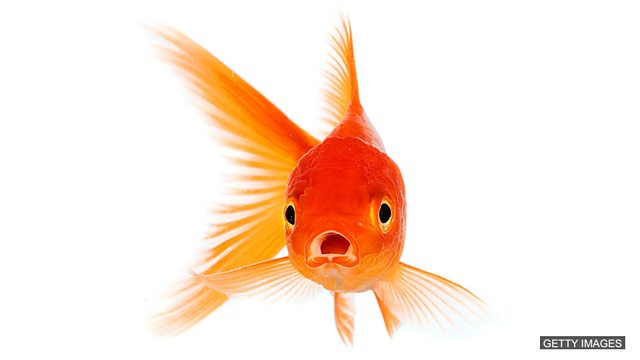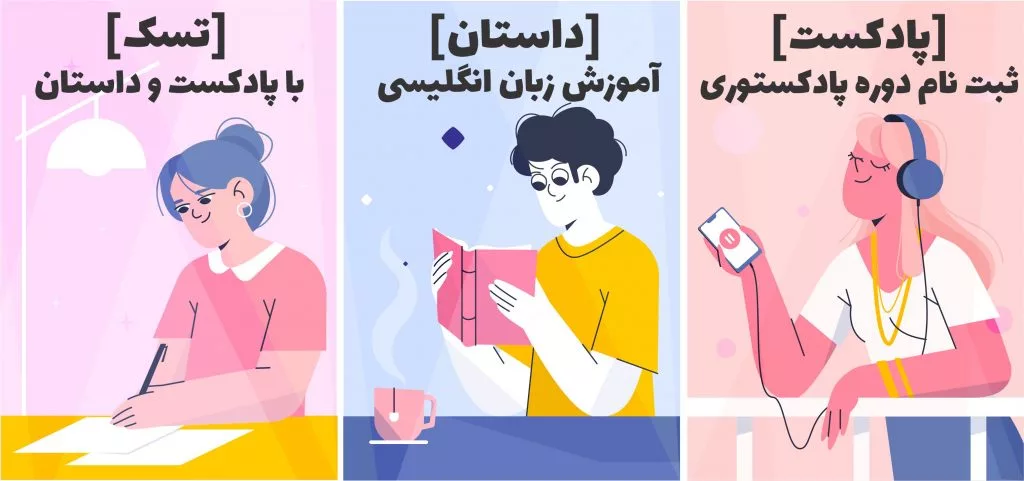پادکست انگلیسی BBC – حافظه
در پادکست انگلیسی BBC – حافظه ، درباره قدرت حافظه و تمرکز انسانهای عصر جدید صحبت میشه. در دورانی تلفنهای هوشمند وجود دارد و برای دسترسی به اکثر اطلاعات تنها چند کلیک لازم است، شاید میتونیم بگیم که استفاده از قدرت حافظه تعداد زیادی از انسانها بسیار کاهش یافته و در برخی موارد با حافظه ماهی قرمز قابل مقایسه است.
سوال پادکست انگلیسی BBC – حافظه:
How long do we look at our mobile phones for in a day, on average?
a) Around 30 minutes
b) Around two and a half hours
c) Over three hours
به پادکست خوب گوش کن تا جواب رو پیدا کنی.
اگر می خوای گوش دادن به پادکست تا حد امکان برات ساده و کارآمد باشه مراحل زیر را دنبال کن:
هر روز به پادکست گوش کن. وقتی براش یه وقت ثابت در روز در نظر بگیری برات تبدیل به عادت میشه و این عادت هرروز پیشرفت میکنه.
پادکستی رو پیدا کن که موضوعش برات جالب باشه. وقتی از خود موضوع لذت ببری یادگیری هم برات لذتبخش میشه.
به پادکستی گوش کن که transcript یا متن داره. این بهت کمک می کنه تا کلمات و عبارات جدید رو به سرعت در متن پیدا کنی و ساختار انواع مختلف جمله رو خوب یاد بگیری.
پس از گوش دادن به پادکست با متن، در مرحله بعدی سعی کن بدون نگاه کردن به متن این کار رو انجام بدی. این کار مهارت شنیداری رو تقویت می کنه و کمک می کنه تا انگلیسی زبانان بومی را راحت تر درک کنی، حتی اگر خیلی سریع صحبت کنن.
اگه به پادکست انگلیسی گوش کردی و نتونستی کامل متوجه اش بشی، ناامید نشو. پادکست هایESL -English as Second Language بیشماری وجود دارن که برای سطوح مختلف، از ابتدایی تا پیشرفته طراحی شدن. مطمئنا هر روز می تونین یه پادکست مناسب با سطح خودت پیدا کنی.
فراموش نکن که هرچی بیشتر تمرین کنی در اون مهارت رشد میکنی! به قول انگلیسی ها: Practice makes perfect
واژگان کلیدی پادکست انگلیسی BBC - حافظه
| معنی به فارسی | معنی به انگلیسی | واژه |
| مدت زمان توجه | the length of time you can focus on something | attention span |
| تمرکز کسی را از چیزی دور کند | the remains of food or a meal, which have not been eaten | to distract |
| انتقاد در رسانهها | criticism in the media | a bad press |
| مشکوک | suspicious | fishy |
| انجام دادن چند وظیفه به صورت همزمان | to do several things at once | to multitask |
| در اینجا ) بسته به ) | (here) depending on | down to |
BBC 6 minute English -Goldfish, brains and phones

برای دانلود پادکست روی سه نقطه سمت راست کلیک و گزینه Download را انتخاب کنید.
متن پادکست انگلیسی BBC - حافظه
Neil
Hello and welcome to 6 Minute English – the programme where we bring you an interesting topic and six items of vocabulary. I'm Neil.
Catherine
And I'm Catherine. Now, this programme is six minutes long.
Neil
Yes. It's 6 Minute English!
Catherine
And we have a challenge for everyone – can you stay focused for the full six minutes?
Neil
Sounds easy? Maybe not, because today we're talking about our attention spans: are they shrinking?
Catherine
That's right, so we're asking today: is the length of time we can focus on something – that's our attention span – actually getting shorter? Now, one study says that – in fact, it claims the human attention span is now shorter than that of a goldfish.
Neil
Can that be true? Smartphones, the internet, social media – these all certainly do take up a lot of our attention. But how much? How long do we look at our mobile phones for in a day, on average? Is it…
a) around 30 minutes,
b) around two and a half hours, or
c) over three hours?
Catherine
I tend to be quite busy, but I know some people are really addicted to their mobile phones so I'm going to say around two and a half hours - that's answer 'b'.
Neil
OK, so, a report released by Microsoft said the average human attention span in 2000 was 12 seconds. Since then it's fallen to just eight seconds.
Catherine
Right, and that's a massive change in a very short time. Now, the year 2000 was just before the boom in digital media and smartphones, so many think they're to blame for all these distractions – now, distractions are things which take away our focus or attention.
Neil
Yes. And we mentioned goldfish earlier – goldfish reportedly have an attention span of nine seconds. That's one more than phone-obsessed humans with a mere eight seconds!
Catherine
And there's a phrase in English – we say 'to have the attention span of a goldfish'. Or 'the memory of a goldfish'. So these poor… poor gold goldfish, Neil.
Neil
Yes, they get a bad press, don't they? That's a phrase which means 'criticism' – especially criticism in the media and especially in newspapers – or the 'press', as we call it.
Catherine
So – is it really true than humans are now even more easily distracted than fish?
Neil
Well, BBC radio programme More or Less recently investigated this claim.
Catherine
That's right. And they found out a couple of things. Firstly – they couldn't find evidence of the research that Microsoft quoted in their report. In other words, the programme couldn't find scientific evidence that our attention spans are in fact shrinking.
Neil
And secondly – the psychologist they spoke to said there are problems with the idea of measuring attention spans in the first place. It's a term that's widely used, but it's not very scientific.
Catherine
Sounds fishy.
Neil
Yes. Fishy means ‘suspicious', by the way. Sorry, goldfish. Again.
Catherine
So, are we humans in fact more easily distracted than before? More or Less asked Dr Gemma Briggs, a psychologist at the Open University, if human beings are less able to focus these days.
INSERT
Dr Gemma Briggs, Psychology lecturer, Open University
It's all down to the individual; it's all down to how you choose to apply your attention. So attention-switching ability may well have developed in recent years, in the age of the smartphone and the internet. But because someone's distracted by their smartphone or wanting to quickly Google something, it doesn't mean that they then don't have the ability to control and sustain their attention when they carry out another task.
Neil
So she says we're not necessarily more easily distracted. Instead, we may actually be better at switching our attention quickly between different tasks.
Catherine
That's right. She's really saying we can multitask better than before. And that means we can focus on many different tasks, each for a shorter period of time.
Neil
She said: "It's all down to how you choose to apply your attention." Let's just highlight that phrase down to. Here, it means 'depends on'. It all depends on how you choose to apply your attention.
Catherine
So – maybe our attention spans aren't getting shorter, we just choose to look at our phones a lot more.
Neil
Which reminds me today's question. I asked you how long on average we spend looking at our phones, and you said?
Catherine
Well, my attention span is not that short that I can't remember that I said two and a half hours.
Neil
And the answer – if you believe the research – is 2.42 hours per day so, pretty good guess there, Catherine.
Catherine
Thank you.
Neil
That comes from Chicago-based research firm Dscout. And what about this: the group they surveyed touched their mobiles over 2,600 times a day. Do you touch your phone 2,600 times a day, Catherine?
Catherine
I try not to, what about you?
Neil
It's probably more than that to be honest. Now, I'm sure everyone wants to get back to touching their phones – or maybe they're even touching them now as they listen – but either way, let's have a review of today's phrases.
Catherine
OK, so first we had attention span – that's the length of time we can focus on something. And mine is definitely shorter than it used to be… Neil? Neil?
Neil
Sorry – I just got distracted there by a message on my phone. Apologies.
Catherine
That's alright. So, next up we had a bad press. Goldfish get a bad press. Social media gets a bad press. And this means they all get criticism in the media.
Neil
And we had fishy. If something's fishy, it's suspicious.
Catherine
And we had multitask. To multitask is to do several things at once.
Neil
Then we had down to. Here it means 'depends on', though it can mean other things in other contexts. You could say, it's all down to the context!
Catherine
And that's our quick review, and our programme for today. So, did you stay focused all the way through? Or were you distracted?
Neil
If you're looking for distractions – may I recommend our Facebook, Twitter, Instagram and YouTube pages?
Both
Goodbye
امیدوارم از پادکست انگلیسی BBC - حافظه لذت برده باشید.
گوش دادن به پادکست روش خوبی برای تقویت مهارت شنیداری و هم چنین یادگرفتن کلمات در بستر یک موضوع خاصه که این به تقویت مهارت مکالمه انگلیسی نیز کمک زیادی می کنه.
اگه تو هم از اون آدمهایی هستی که از گوش دادن به پادکست لذت می بره برات یه خبر خوب دارم! آموزشگاه زبان انگلیسی 24talk یه دوره طراحی کرده مبتنی بر پادکست و داستان کوتاه به اسم "پادکستوری - Podcastory". این دوره سعی کرده یادگیری زبان انگلیسی رو مناسب با نیاز و سطح زبان آموز به یه فرایند بسیار مفرح، موثر، سریع و کم هزینه تبدیل کنه.
همین الان می تونی با کلیک روی عکس زیر و ثبت نام در دوره ی آموزش زبان انگلیسی با پادکست و داستان ۲۴talk اولین و مهم ترین قدم رو برای یادگیری زبان انگلیسی برداری. وقت رو از دست نده!
دوره پادکستوری آکادمی مجازی 24talk
برای شنیدن دیگر پادکست ها، به بخش پادکست در مرکز آموزش رایگان مراجعه نمایید.









